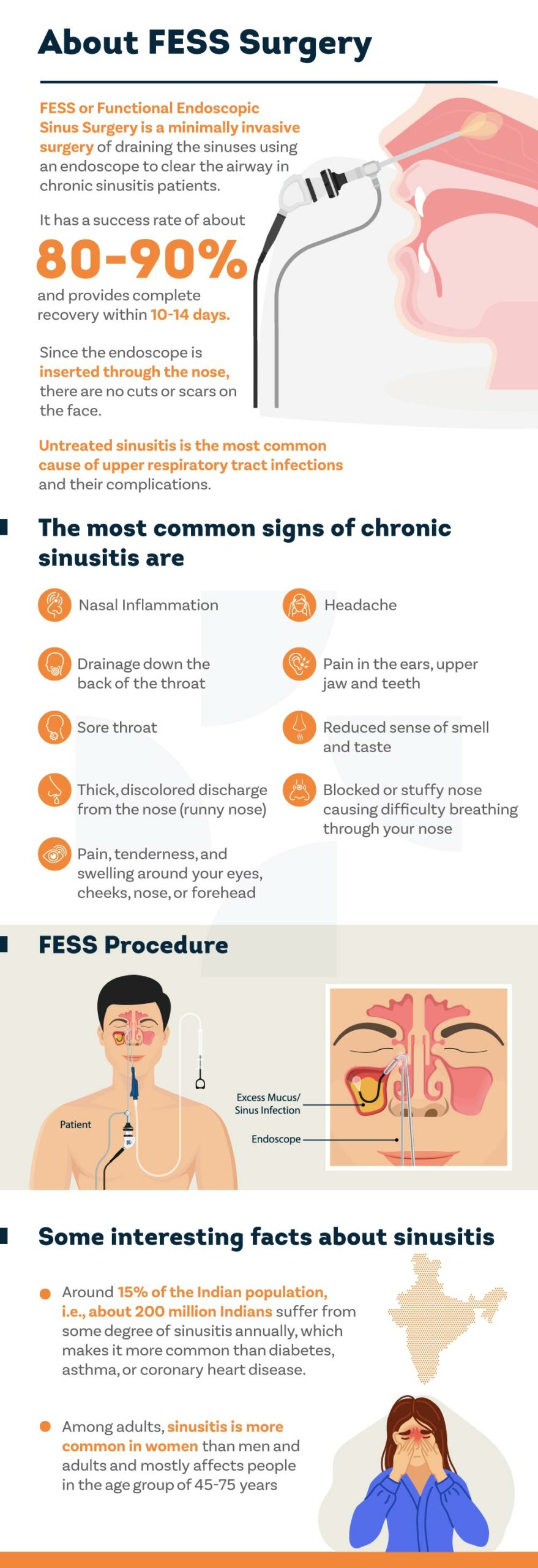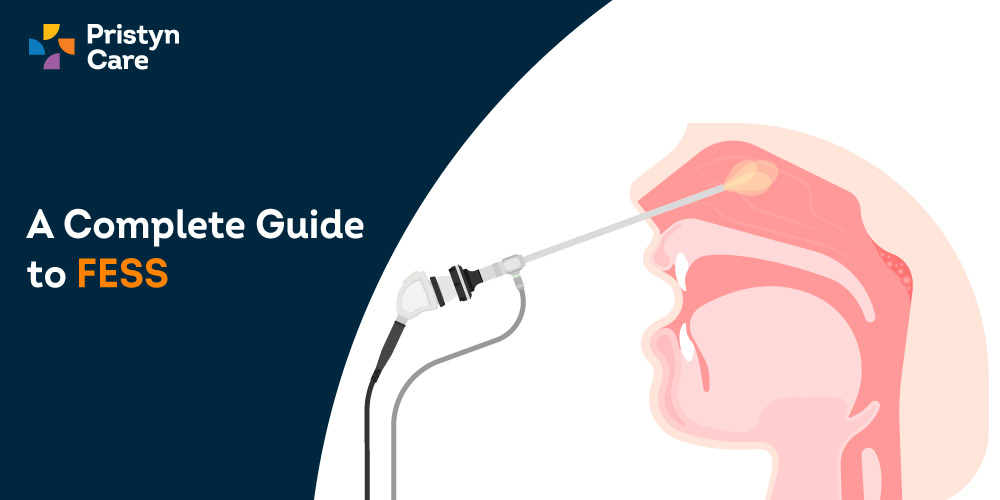![]() Views: 1,100
Views: 1,100
Guide to FESS for sinusitis treatment
Dedicated Support at Every Step!
Our Doctors are available 24 hours a day, 7 days a week to help you!
Table of Contents
What is FESS?
As per its name, the surgery mainly focuses on restoring the function of the sinuses, i.e., it focuses on re-establishing normal ventilation and drainage of the sinuses through endoscopy technique.
The procedure is performed using endoscopic imaging through the nose without making any facial incisions. In addition to draining the sinuses, it restores the normal mucosa integrity and function without extensive destruction of the tissues surrounding the sinuses.
No Cost EMI, Hassle-free Insurance Approval
What are the sinuses?
Sinuses (or paranasal sinuses) are air cavities in the facial and skull bones that ventilate through the air cavity. They make the bone structure of the head more pneumatic and light, which protects the head from injuries, especially during impact accidents.
Healthy sinuses are lined with a layer of tissue and mucus that drain into the nasal cavity. When infected, the airway in these sinuses is blocked and they drain into the nose, which leads to blockage of the sinuses and airway.

When is a FESS procedure recommended?
As a surgical procedure, FESS is not the primary treatment for any medical condition. Instead, it is recommended when the patient has failed to receive relief from conservative treatments such as antibiotics, nasal sprays, corticosteroids, etc.
Patients with the following diseases are considered to be good candidates for FESS surgery:
Chronic sinusitis
Chronic sinusitis signifies a sinus infection that has lasted over 12 weeks. It can be caused due to bacterial/viral infection, growths in the sinuses, or inflammation of the sinuses.
Recurrent acute sinusitis (RARS)
It is a condition in which the patient has 4 or more bouts of rhinosinusitis in a year without persisting symptoms in between the bouts. It commonly occurs due to viral infection.
Deviated nasal septum
A deviated nasal septum is a term for a crooked or off-center nasal septum. Generally, people with a deviated septum have sinus malformation, which can lead to difficulty in breathing and nasal obstruction. In such cases, sinus infections become more difficult to treat without surgical intervention.
Nasal polyps
Sometimes, severe mucosal swellings in sinuses can protrude into the nasal cavity as teardrop-shaped growths, which can block the nasal airway and lead to sinus drainage and infection.
Allergic rhinosinusitis
Allergic rhinitis is a group of allergic disorders with symptoms affecting the nose. It usually occurs due to an allergy to substances like dust, animal dander, or pollen and is incredibly common nowadays. If these allergies lead to sinus inflammation and symptoms, it is termed allergic rhinosinusitis.
In addition to these, FESS is considered a good option for patients suffering from severe or recurring problems such as severe nasal congestion, sinus pressure, post-nasal drip, sinus headaches, migraine, and breathing issues.

How should one prepare for FESS surgery?
Before the surgery, the ENT surgeon will collect your family and medical history. He may conduct diagnostic tests such as CT scans, blood work, EKG, and CXR. If you are taking blood thinners, you may need to stop them 2-3 days before the surgery, and if you are asthmatic, you should diligently take your medicines, even if your asthma seems under control.
You should avoid the following before the surgery as they increase the risk of bleeding:
- aspirin or other salicylate painkillers 10-15 days before the surgery
- NSAIDs (like ibuprofen, naproxen, Advil, Motrin, Aleve, etc.) 5-6 days before the surgery
- Vitamin E supplements
Smoking increases the risks of anesthesia, so do not smoke for at least 3 weeks before the surgery. Stop eating and drinking at midnight before the day of the surgery.
How is the FESS surgery procedure performed?
While FESS can be performed as an outpatient procedure, you may need to stay in the hospital for one day to make sure there are no postoperative complications. In order to avoid facial scarring and incisions, the surgery is performed through the nose. This also helps avoid postoperative bruising and swelling.
The procedure can be performed under local anesthesia or intravenous sedation, but general anesthesia is preferred. Then, an endoscope is inserted through the nose to obtain better visuals of the internal sinus structures and determine if any anatomical correction is required in addition to sinus drainage.
FESS is often accompanied by corrective procedures like septoplasty and turbinate surgery to belay the recurrence of sinus problems. Once the correction and drainage are done, the nose is packed with absorbent dressings to stop the bleeding and the patient is moved to a recovery ward.
What happens after FESS procedure?
Once the patient is discharged, proper care at home is a must to improve recovery. While there may be a little postoperative pain and bleeding, it is normal and can be managed conservatively.
The patient should avoid hot foods and drinks during the recovery period as they may increase the bleeding. Additionally, strenuous activities that may strain the noise should be avoided for at least two weeks.
The patient may experience nasal congestion and mild to moderate headaches during recovery, but they can be managed via medicines.
Patients should use salt-water nasal sprays or douches to thoroughly clean the nose of the mucus and congealed blood.
Avoid blowing your nose for a few days as they may lead to bleeding. While a little bleeding is normal and common, heavy bleeding is a complication and you should immediately consult a doctor.
If splints are used during the procedure, they are removed 8-10 days after the surgery, which noticeably improves the breathing.
You can return to work 1 week after the surgery and should not fly or swim for at least 2 weeks after the surgery.
Is FESS effective?
Since FESS is a targeted treatment, it is highly effective in eliminating sinus blockages and treating sinus problems. It is even more precise than other sinus surgeries such as balloon sinuplasty.
What are the risks associated with FESS?
- Bleeding
- Vision loss
- Temporary (or prolonged) double vision
- Infection
- Cerebral Spinal Fluid (CSF) leak
- Decreased sense of smell
- Swelling, bruising, or temporary numbness of the lip and eye
- Anestheisa-related risks
Also Read: Does Insurance Cover Sinus Surgery?
Which factors should one consider while selecting a surgeon for FESS surgery?
While you can visit your family practitioner or general medicine doctor for sinusitis treatment, you should consult an expert ENT specialist for sinus surgery to ensure there are no complications or recurrence after the surgery.
You should check the doctor’s qualifications and experience before consulting them. Additionally, you should make sure that they deliver good results and maintain a patient-friendly environment.










